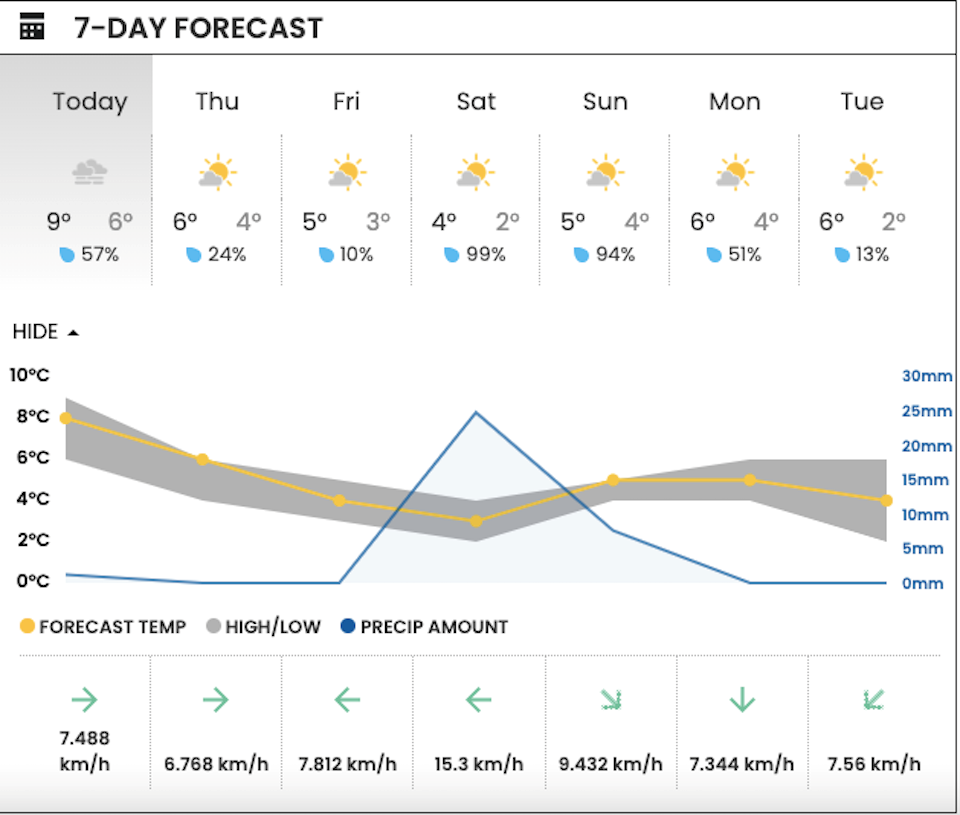The Metro Â鶹´«Ã½Ó³»weather forecast includes a frosty change of pace heading into next week -- but it isn't entirely unexpected.
On Monday, Dec. 4, an atmospheric river pummelled B.C.'s coast with heavy rain and wind, resulting in localized flooding and hazardous travel conditions. A woman told V.I.A. that she experienced some of the "most severe turbulence" of her life flying into Â鶹´«Ã½Ó³»International Airport (YVR) and shared a video.
But the wet and wild weather also produced above-average temperatures across the region.
Environment Canada Meteorologist Derrick Lee says temperatures will now start to cool off heading into the weekend but Saturday is expected to see rain throughout the day and overnight.
"Up in the higher terrain, it's cold enough that we will see snow," Lee noted, adding that places down to 500 meters could see some of the white stuff.
After Saturday's rainfall, a cold pattern is expected to kick off starting Sunday. While the daytime high should reach the seasonal average (7 C), the overnight low is expected to dip down to the freezing mark. Monday's forecast includes even colder weather, with overnight lows dipping down to -2 C in some places across Metro Vancouver.
Temperatures tend to get colder frequently around this time of year because the winter solstice is approaching. Since it is the shortest day of the year, there is less daytime heating.
While he can't say exactly how cold the rest of next week will be, Lee said the cold weather isn't associated with Arctic air, which Environment Canada can see approaching roughly 10 days in advance.
V.I.A.'s Downtown Centre Weatherhood station shows somewhat milder temperatures than YVR airport. However, temperatures are expected to dip down close to freezing overnight by the start of next week. And folks in the downtown area won't escape Saturday's downpour; the weather station shows a 99 per cent chance of rainfall with amounts up to 25 mm (be sure to pack your rain gear).
The atmospheric river continues to affect the Metro Â鶹´«Ã½Ó³»weather forecast
Lee said atmospheric rivers come from the tropics and tend to increase temperatures locally. This event was considered a Pineapple Express because it originated near Hawaii.
Heavy cloud coverage has kept temperatures warmer than usual and the region continues to see remnant elevated temperatures from the weather event. On Wednesday, for example, temperatures at YVR airport are expected to reach a high of 11 C and a low of 6 C, which is several degrees above the seasonal averages of 7 C and 1 C, according to historical climate data.
While it drenched the B.C. coast with ample rainfall, this atmospheric river had "more or less minor impacts," particularly when compared to 2021's devastating floods, Lee described.
In the 2021 event, there was a lot of snowpack and the heavy rainfall melted everything at higher elevations. This year had significantly less snowpack due to below-average precipitation levels over the fall. Plus, the 2021 storm lasted about twice as long and produced much more rainfall.
El Niño is also in effect after three La Niña winters and the national weather department expects that it will contribute to overall milder temperatures in the region.
Rainfall amounts and temperatures can vary drastically across the Lower Mainland -- even in areas that aren't that far away from one another.
Curious about what's in store for your neck of the woods...or urban jungle?
Use Weatherhood's interactive map to get up-to-date information for over 50 weather stations including a breakdown of 6-, 12-, and 24-hour forecasts as well as the seven-day outlook.




